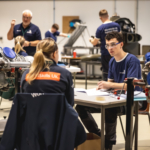‘The UK boasts some of the finest universities in the world, universities that we can be proud of and that all governments should pledge to support and protect. But in technical education, we have fallen behind other leading nations. Our further education colleges have the potential to transform lives and grow our economy, but the FE landscape can be confusing to navigate. Too many students, parents and employers see further education as a second-best option. And successive governments have failed to give it the support it needs’.
The Prime Minister’s speech in response to the newly published Augar Review into post-18 education and funding in England was frank in its assessment of the historical records of all governments on these crucial parts of the education system: ‘could do better’. The prioritisation of higher education over technical and further education is evidenced by the fact that the Augar Review is the first in over 65 years to consider the way forward for the whole of tertiary education (HE, FE and technical education) together. To put that into context, not since the UK started competing in skills competitions in the 1960s has the system we draw our competitors from been subject to the kind of wholesale review that Augar represents. The review is therefore timely and welcome and based on what the Prime Minister said in her speech, I think there are three key points that are worth reflecting on.
The first relates to investment. To build a world-class system of technical and further education requires a long-term investment plan; unfortunately, as the Augar review makes clear, we have witnessed the direct opposite: ‘despite widespread acknowledgement that this sector is crucial to the country’s economic success, nothing much has happened except for a steep, steady decline in funding’. Last week our report with colleagues at the think tanks RSA and FETL held up countries such as Russia, China, Switzerland and Singapore as exemplars for their models of technical education. The common thread in these countries? Long-term investment and a belief in the potential of technical education to make significant contributions to the economy. We know that we have fallen behind but with longer term thinking across the system we could perform at the very front of the pack.
The second relates to productivity. Given our recent launch of the WorldSkills UK Productivity Lab, I was particularly pleased to see the review highlight the connection between productivity growth and skills excellence. It states how we need ‘a stronger technical and vocational education system at sub-degree levels to meet the structural skills shortages that are in all probability contributing to the UK’s weak productivity performance’. We know that in countries like Germany it takes the workforce four days what it takes the UK workforce to produce in five, and this productivity differential can be evidenced in a statistic highlighted by the Prime Minister in her speech: ‘in Germany 20 per cent of the workforce holds a higher technical qualification. Here in the UK, just four per cent of 25-year-olds can say the same’. If we want to match German productivity levels, and those of other leading nations like France and the USA, then we need to raise our game significantly and encourage more young people to pursue higher level technical qualifications. It’s this mission that the Productivity Lab is seeking to realise.
The third relates to the role of colleges. The beating heart of WorldSkills UK’s skills competitions system is undoubtedly the network of FE colleges across the country from which we draw the vast majority of our competitors. It is these institutions that inject the enthusiasm into our young people which makes them go on to strive for the brightest possible futures. And so it is a huge step in the right direction that the review calls for the reinvigoration of FE: more funding, higher status and a long-term vision. WorldSkills UK endorses the review’s sentiments in relation to the sector: a healthy FE system can only be a good thing for the UK’s ability to compete internationally – and we look forward to working with government, business and other stakeholders to implement the vision set out here.
The Augar Review’s publication and the PM’s positive response to it gives the skills sector a much needed shot in the arm. It will of course be for the government to determine whether and how these recommendations are taken forward – and we look forward to the response later in the year. For our part, we will take the forward thinking, creative spirit embedded in this review and work with governments across the UK to further develop our skills base, mainstreaming global excellence to boost productivity and contribute to economic growth. Over to you, next Prime Minister…


